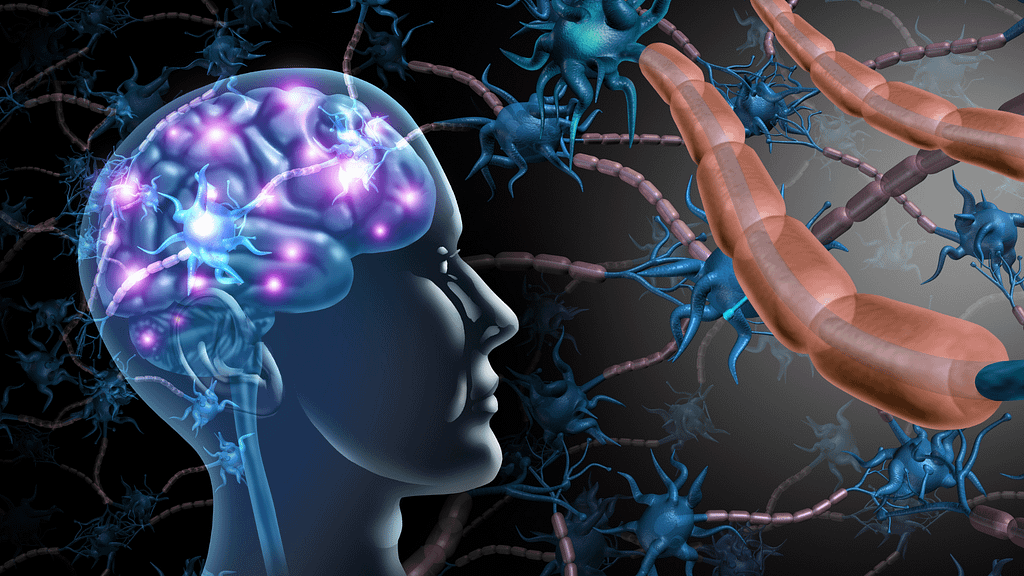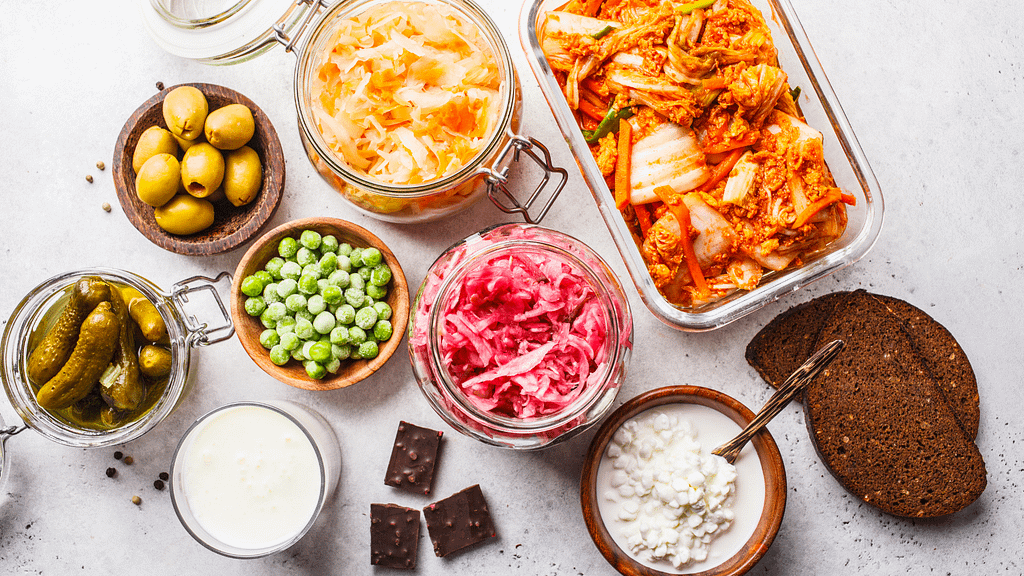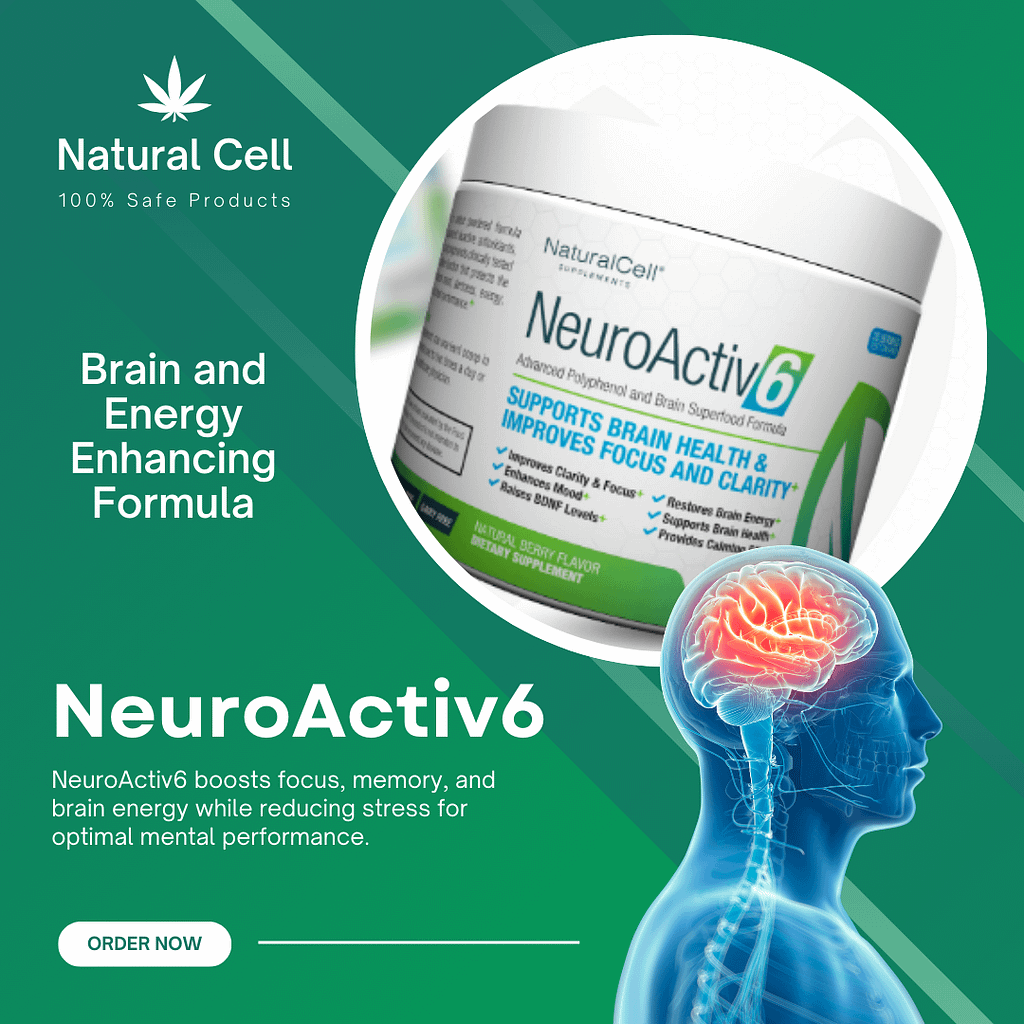
Did you know your gut does way more than just digest food? It’s often called your “second brain” because it communicates constantly with your actual brain through what scientists call the gut-brain axis. This connection means your gut health has a huge impact on your mood, stress levels, and mental clarity.
In fact, about 90% of your body’s serotonin, the chemical that helps regulate happiness and calm, is produced in your gut. That’s right! What you eat influences your mental health more than you might realize.
So, if you’re struggling with anxiety, brain fog, or mood swings, the solution might be sitting right on your plate. Improving your mental wellness can start with simple changes like adding probiotic foods, choosing a gut-friendly diet (aka the microbiome diet), and practicing easy digestion habits.
Over this blog, you’ll learn the best gut health tips, discover the difference between prebiotics vs. probiotics, and find out which foods can naturally support your brain by nurturing your gut. Let’s unlock the secrets of the gut-brain axis to boost your mental health from the inside out!
Understanding the Gut-Brain Axis: Your Body’s Communication Superhighway
The gut-brain axis is the amazing two-way communication network between your gut and your brain. Think of it as a superhighway where messages travel constantly, influencing everything from digestion to mood and even memory.
Your gut is home to trillions of microbes—collectively called the microbiome. These tiny bacteria, viruses, and fungi are not just passive residents; they actively talk to your brain. How? Through multiple pathways:
- Vagus nerve: The longest nerve connecting your gut and brain, carrying signals back and forth.
- Chemical messengers: Your gut microbes produce neurotransmitters like serotonin, dopamine, and gamma-aminobutyric acid (GABA), which influence mood and anxiety.
- Immune system: Gut bacteria regulate immune responses, affecting inflammation that impacts brain health.
Here’s a fun fact: The gut produces around 90% of the body’s serotonin, a key “feel-good” chemical. This means a happy gut can literally help create a happier brain.
How the Microbiome Talks to Your Brain
Your microbiome acts like an orchestra conductor, regulating signals sent to your brain. A balanced and diverse microbiome promotes clear communication, which supports good mood regulation and stress management.
When your microbiome is out of balance—called dysbiosis—bad bacteria can release toxins that cause inflammation. This inflammation can travel to the brain, potentially triggering anxiety, depression, and cognitive issues.
Research shows that people with depression often have less diversity in their gut bacteria. The good news? You can influence your microbiome through your diet and lifestyle.
The Role of Neurotransmitters Produced in the Gut
Neurotransmitters are brain chemicals that control mood, sleep, focus, and more. Your gut bacteria help produce:
- Serotonin: Regulates mood, sleep, and appetite.
- Dopamine: Drives motivation and pleasure.
- GABA: Calms the nervous system, reducing anxiety.
By feeding your gut the right nutrients, you can boost the production of these vital chemicals, naturally improving your mental health.
Gut Health Tips for Better Mental Health: Start With Your Plate
Now that you understand the gut-brain axis, it’s time to nourish it. Here’s how:
1. Eat a Balanced Diet Rich in Microbiome Diversity
Aim for variety! Eating different types of fruits, veggies, whole grains, and fermented foods feeds diverse bacteria, creating a thriving ecosystem. Diversity in your gut is linked to better mental health.
2. Adopt Healthy Digestion Habits
Simple habits like chewing slowly, staying hydrated, and managing stress protect your gut lining and improve digestion. Avoid rushing meals or eating on the go.
3. Avoid Processed and Inflammatory Foods
Highly processed foods, excessive sugar, and artificial additives feed harmful bacteria and cause inflammation. Cutting these out reduces gut irritation and brain fog.

Quick Habit Swap Idea
Instead of grabbing a sugary snack, try reaching for a handful of nuts and some fermented pickles. This small change adds fiber and probiotic foods while cutting sugar, feeding your microbiome and calming your mind.
The Microbiome Diet: What to Eat and Why
Eating for your gut means focusing on foods that nurture your gut bacteria. This approach is called the microbiome diet, and it’s packed with both probiotic foods and prebiotic foods. Together, they help build a strong, balanced gut microbiome—key to improving mental health through nutrition.
What Are Probiotics, and Why Are They Important?
Probiotics are live beneficial bacteria found in certain foods. They help replenish your gut flora, keeping harmful bacteria in check. You’ve probably heard about the fermented foods benefits, and it’s true—these foods are among the best natural sources of probiotics.
Adding probiotic foods like yogurt, kefir, kimchi, and sauerkraut to your meals introduces healthy bacteria that support digestion and brain health. These foods help maintain the integrity of your gut lining and improve communication along the gut-brain axis.
Prebiotics Probiotics: What’s the Difference?
While probiotics are live bacteria, prebiotics are the fibers and nutrients that feed these good bacteria. Think of prebiotics as the fertilizer and probiotics as the plants they help grow.
Common prebiotic foods include onions, garlic, bananas, asparagus, and whole grains. These foods aren’t digested by you but instead nourish your microbiome, helping probiotics thrive. Including both in your diet creates a powerful synergy for gut and mental health.
Examples of Probiotic-Rich Foods to Add Now
- Yogurt: Rich in live cultures like Lactobacillus, great for daily probiotic intake.
- Kimchi: A spicy Korean fermented vegetable that’s a gut powerhouse.
- Sauerkraut: Fermented cabbage loaded with probiotics and vitamins.
- Kefir: A tangy fermented milk drink with diverse beneficial bacteria.
Try adding these to meals or snacks to naturally boost your gut bacteria and support your mental well-being.
How Probiotic Foods Support Mental Wellness
Eating probiotic foods isn’t just about digestion—it directly impacts your brain. Studies show that regularly consuming fermented foods is linked to reduced symptoms of anxiety and depression.
This happens because probiotics influence the production and balance of key neurotransmitters like serotonin and GABA in your gut. By helping regulate these “feel-good” chemicals, probiotics promote a calmer mind and better stress response.
Moreover, fermented foods benefits extend to reducing gut inflammation. Since chronic inflammation in the gut can trigger mood disorders, probiotics help by soothing this inflammation and restoring balance.
In other words, your favorite probiotic snacks can act like natural mood boosters, calming your nervous system and improving your mental clarity.
Fun Fact:
A study published in Nutrients found that people who ate more fermented foods experienced less social anxiety and stress, showing just how powerful your microbiome diet can be for mental health.
Healthy Digestion Habits to Boost Gut-Brain Health
Improving your gut health—and by extension your mental health—means more than just eating the right foods. It’s about cultivating healthy digestion habits that support your microbiome and keep your gut-brain axis humming smoothly.
1. Chew Well and Stay Hydrated
Chewing food thoroughly breaks it down, making nutrients easier to absorb and reducing digestive stress. Aim to eat slowly and mindfully, putting down distractions like phones or TV.
Drinking plenty of water throughout the day helps flush toxins and keeps your digestion regular. Proper hydration supports the movement of food through your gut and nourishes your microbiome.
2. Manage Stress Effectively
Chronic stress disrupts gut bacteria balance and damages the gut lining, impairing communication along the gut-brain axis. Incorporate stress-relief practices like meditation, yoga, deep breathing, or even daily walks. These activities calm your nervous system and promote a healthier gut environment.
3. Avoid Antibiotic Misuse
While antibiotics fight infections, they can also wipe out beneficial bacteria in your gut, creating imbalances that harm mental wellness. Use antibiotics only when prescribed and complete the full course. After antibiotics, focus on probiotic foods and prebiotics to help your microbiome recover.
4. Exercise Regularly and Prioritize Sleep
Physical activity stimulates gut motility and supports a diverse microbiome. Even light exercise like walking can help reduce anxiety and improve digestion.
Sleep is equally important; poor sleep patterns disrupt gut bacteria and increase inflammation. Aim for 7-9 hours of quality sleep to keep your brain and gut in sync.
Practical Tips to Incorporate These Habits Daily
Ready to put these habits into action? Here are some easy, practical tips to start improving your gut-brain health right now.
Simple Meal Ideas for Your Microbiome Diet
- Breakfast: Greek yogurt topped with sliced banana and a sprinkle of flaxseeds (prebiotics + probiotics!)
- Lunch: Mixed greens salad with sauerkraut or kimchi, roasted garlic dressing, and grilled chicken or chickpeas
- Snacks: Kefir smoothie with berries or raw veggies dipped in garlic hummus
How to Introduce Fermented Foods Gradually
If fermented foods are new to you, start slow to avoid digestive discomfort. Try adding small amounts once or twice a week, then gradually increase to daily servings. Your gut will thank you!
When to Consult a Healthcare Professional
If you experience persistent digestive issues, severe mood changes, or suspect antibiotic-related imbalances, seek advice from a healthcare provider. They can help tailor a plan that fits your unique gut-brain health needs.

Conclusion: Nourish Your Gut, Boost Your Brain, Transform Your Mental Health
Your gut is truly your body’s second brain — and taking care of it is one of the smartest ways to improve mental health naturally. By following proven gut health tips, embracing the microbiome diet, and regularly eating probiotic foods like yogurt, kimchi, and kefir, you’re feeding the powerful gut-brain axis that controls mood, stress, and mental clarity.
Remember, balance is key. Pair those probiotics with prebiotic-rich foods like garlic, onions, and bananas to create a thriving microbiome ecosystem. Combine this with healthy digestion habits—chewing well, staying hydrated, managing stress, and sleeping well—and you’re setting the foundation for a calmer, happier mind.
Science backs it up: nurturing your gut isn’t just about digestion; it’s a powerful tool to reduce anxiety, fight depression, and boost overall brain health. So start small, make mindful food choices, and watch how your mental wellness transforms from the inside out.
Your mental health journey starts with your gut—feed it well and feel the difference.
FAQs About the Gut-Brain Connection and Nutrition
Q1: What is the gut-brain axis, and why is it important?
The gut-brain axis is the communication network between your gut and brain. It plays a crucial role in regulating mood, stress, and overall mental health by sending signals through nerves and chemical messengers. A healthy gut supports a happier, calmer brain.
Q2: How do probiotic foods improve mental health?
Probiotic foods like yogurt, kimchi, and kefir introduce beneficial bacteria that help balance your microbiome. This balance influences neurotransmitter production, reducing anxiety and depression symptoms by calming the nervous system.
Q3: What’s the difference between prebiotics and probiotics?
Probiotics are live bacteria found in fermented foods. Prebiotics are fibers that feed these bacteria, found in foods like garlic, onions, and bananas. Together, they nourish your gut microbiome for better digestion and mental wellness.
Q4: Can fermented foods help with anxiety and depression?
Yes! Research shows that eating fermented foods benefits mental health by reducing inflammation and improving neurotransmitter balance, which lowers anxiety and depression symptoms.
Q5: What are some easy gut health tips I can start today?
Start by eating diverse probiotic and prebiotic foods, chewing slowly, staying hydrated, managing stress, exercising regularly, and getting enough sleep. These habits improve digestion and support the gut-brain axis.
Q6: How long does it take to see mental health benefits from improving gut health?
Results vary, but many people notice mood and digestion improvements within a few weeks of consistent gut-friendly eating and habits. Patience and consistency are key.
Q7: Should I take probiotic supplements?
Whole foods are the best source of probiotics, but supplements can help if recommended by a healthcare provider. Focus first on diet and healthy digestion habits for lasting benefits.

